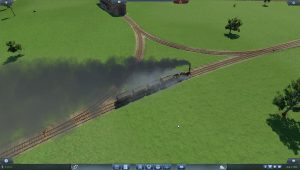Learning from mistakes
During my ongoing literature review I often discover interesting facts about things I’ve never thought about. Sometimes I can connect these facts with my own observations: The result is mostly a completely new idea why things are as they are. Maybe these ideas are new to you, too. Therefore I’ll share my new science based knowledge with you!
This week: This time, I think about the need for good tools to analyze the own gameplay for the purpose of developing an in-depth understanding of a game’s underlying principles.
Recently, I had to start a new game in Transport Fever because I made too many mistakes during my first attempt of successfully establishing a transport business and, as a result, I was about to go bankrupt. Of course, this was not a surprise to me as I already expected to encounter some issues the first time I play the game as I needed to develop an in-depth understanding of the functionality of the game’s game mechanics.

Transport Fever
However, before I started the new game, I took some time to analyze my steps and decisions that ultimately caused me to lose the game. In the end, I found out that I focussed on the wrong types of cargo at the start of the game. The ultimate goal of a player is to satisfy the needs of virtual cities by delivering the demanded products. For this purpose, the player must satisfy the requirements of those industries that produce the demanded products. This can become quite challenging as some factories demand multiple types of materials and stop to accept additional deliveries over time when not all requirements are satisfied or their final products are not shipped. As a result, a player can not just focus on the transport of one specific good but has to satisfy the entire supply chain for the final product that is demanded by the cities. Unfortunately, I was not aware of this game mechanic and, as a result of this, I ran out of money as my transport lines ceased to generate revenue over time.
While analyzing my first failed Transport Fever game was simple, other games are much more complex and hence it is much harder to learn from the own mistakes as too many variables play a role. Therefore, in order to allow players to learn from their failures, it is important that computer games provide many statistics or even a replay function at the end or even during the game that allow for a good analysis of the own performance.
This, of course, is even more important when the game is intended to help learners to learn or practice new knowledge. Without a good way to learn from the own failures, it is much harder to find the correct solution to a specific problem and hence makes the entire learning process more complicated or can even cause a high degree of frustration.
As a conclusion, allowing players to analyze their gameplay after a failure greatly helps them to develop an in-depth understanding of the underlying principles which ultimately can result in a better gameplay performance or learning outcome.